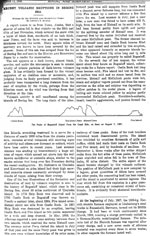Makushin 1907/7
Start: 12:45:00 July 3, 1907 [1]
Event Type: Explosive
Description: Jaggar (1908) climbed Makushin on July 3, 1907 and reported: "The rim of the crater was finally reached at 12:45. Within was an expanse of snow, probably two miles in diameter, through which three or four steaming vents have maintained openings. Here we encountered fog and rain lifting and closing at intervals. We saw a steaming cavity ahead to the right. Examination proved this to be a new crater opening which was unknown to the guide, therefore it was promptly named the "Technology Crater" of Makushin. It is a vertical cavity in the snow, 75 feet in diameter, with a 300-foot wall of bedded ice and snow behind it and sulphurous steam incessantly rising through it. A great tumble of snow or ice blocks rests in front of it, and, where the steam drifts across these, their white surfaces are yellowed with sulphur." This crater is located between the central cone and the north rim of the caldera.
He also reported that the larger crater of Makushin contained very active solfataras on its northern side, and they also found a 15-foot diameter area of boiling mud.
The logbook of the USS Thetis (then the US Revenue Cutter Service Thetis) also records an eruption from Makushin during 1907. On Sept 1, 1907, they were anchored in Unalaska, and wrote "Between 5-00 and 5-30, heard two distinct explosions supposed to be from Makushin volcano. At 5-30, a thick shower of cinders and ashes from Mt. Makushin swept over the harbor and continued until 6-30, when light rain set in. Vessel covered with thin coat of cinders and ashes. Washed down decks and paint work. At 8-00, light shower of ashes from volcano again swept over harbor continued generally until midnight." The logbook record is viewable at the OldWeather project: https://oldweather.s3.amazonaws.com/ow3/final/USS%20Thetis/vol612/vol612_069_1.jpg
As the weather for that day was recorded as east-south-easterlies all day, their supposition that the eruption originated from Makushin is the most likely. Thank you to the OldWeather project for transcribing this logbook and notifying AVO of the eruption account.
He also reported that the larger crater of Makushin contained very active solfataras on its northern side, and they also found a 15-foot diameter area of boiling mud.
The logbook of the USS Thetis (then the US Revenue Cutter Service Thetis) also records an eruption from Makushin during 1907. On Sept 1, 1907, they were anchored in Unalaska, and wrote "Between 5-00 and 5-30, heard two distinct explosions supposed to be from Makushin volcano. At 5-30, a thick shower of cinders and ashes from Mt. Makushin swept over the harbor and continued until 6-30, when light rain set in. Vessel covered with thin coat of cinders and ashes. Washed down decks and paint work. At 8-00, light shower of ashes from volcano again swept over harbor continued generally until midnight." The logbook record is viewable at the OldWeather project: https://oldweather.s3.amazonaws.com/ow3/final/USS%20Thetis/vol612/vol612_069_1.jpg
As the weather for that day was recorded as east-south-easterlies all day, their supposition that the eruption originated from Makushin is the most likely. Thank you to the OldWeather project for transcribing this logbook and notifying AVO of the eruption account.
References Cited
[1] Journal of the technology expedition to the Aleutian Islands, 1907, 1908
Jaggar, T. A., 1908, Journal of the technology expedition to the Aleutian Islands, 1907: The Technology Review, v. 10, n. 1, p. 1-37.[2] Recent volcanic eruptions in the Bering Sea, 1908
Eakle, A. S., 1908, Recent volcanic eruptions in the Bering Sea: Mining and Scientific Press, v. 96, p. 353.Complete Eruption References
Volcanoes of the world [2nd edition], 1994
Simkin, Tom, and Siebert, Lee, 1994, Volcanoes of the world [2nd edition]: Tucson, Arizona, Geoscience Press, 349 p.
Hard Copy held by AVO at FBKS - CEC shelf
Recent volcanic eruptions in the Bering Sea, 1908
Eakle, A. S., 1908, Recent volcanic eruptions in the Bering Sea: Mining and Scientific Press, v. 96, p. 353.

Journal of the technology expedition to the Aleutian Islands, 1907, 1908
Jaggar, T. A., 1908, Journal of the technology expedition to the Aleutian Islands, 1907: The Technology Review, v. 10, n. 1, p. 1-37.

Logbooks of the U.S. Revenue Cutter Service Thetis, 1906 and 1907, 1907
Logbooks of the U.S. Revenue Cutter Service Thetis 1906 and 1907, 1907. Transcripts available at https://classic.oldweather.org/ships/500dc361cd0db40002000025 .